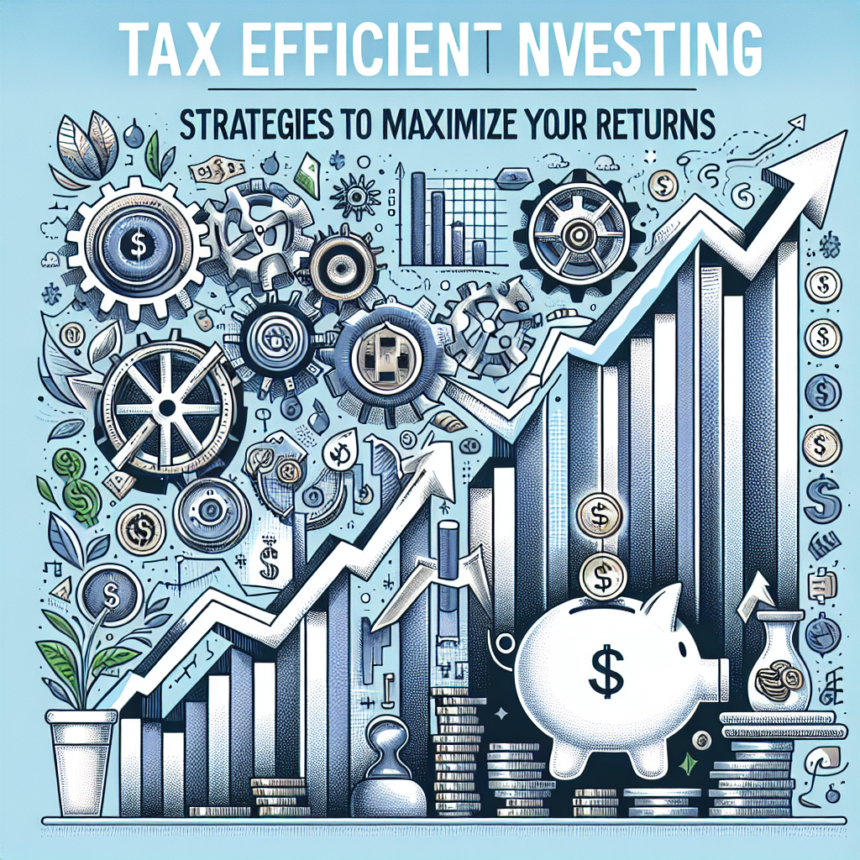In today’s financial landscape, investors must navigate a myriad of choices that can influence their long-term wealth accumulation. Among the most critical factors to consider is taxation. Tax efficient investing focuses on strategies that allow individuals to keep more of what they earn by minimizing their tax liability. Understanding these strategies can significantly enhance your investment returns. Here, we dive into effective methods for maximizing your returns while minimizing tax hit.
1. Utilize Tax-Advantaged Accounts
Two primary types of accounts can help investors defer or eliminate taxes: Roth IRAs and 401(k)s.
-
Roth IRA: Contributions are made with after-tax dollars, allowing your investments to grow tax-free. Withdrawals in retirement are also tax-free, making it an ideal choice for younger investors in lower tax brackets.
- 401(k): With a traditional 401(k), contributions are made pre-tax, reducing your taxable income in the year you contribute. However, taxes will apply upon withdrawal during retirement.
By maximizing contributions to these accounts, you can effectively shield your investments from immediate taxation.
2. Understand Capital Gains Taxes
Capital gains taxes apply to the profit from the sale of an asset. Typically, these gains are classified into two categories: short-term and long-term.
-
Short-term capital gains (for assets held less than a year) are taxed at your ordinary income tax rate, which may be significantly higher.
- Long-term capital gains (for assets held for more than a year) are taxed at a lower rate, which can be 0%, 15%, or 20%, depending on your tax bracket.
To optimize your investment returns, aim to hold assets long enough to benefit from lower long-term capital gains rates.
3. Harvest Tax Losses
Tax-loss harvesting is a strategy that involves selling securities at a loss to offset taxes on gains. By doing so, you can lower your overall tax bill and reinvest your capital in other opportunities.
This strategy can be particularly effective in volatile markets where investments may fluctuate. Just ensure you adhere to the IRS rule that prohibits repurchasing a ‘substantially identical’ security within 30 days to avoid a wash sale.
4. Invest in Index Funds and ETFs
Index funds and exchange-traded funds (ETFs) are generally more tax-efficient than actively managed funds. They typically have lower turnover rates, which means fewer trades and, consequently, fewer taxable events.
Furthermore, many ETFs target long-term holds and tend to distribute fewer capital gains to investors, making them an advantageous choice for tax-sensitive portfolios.
5. Consider Municipal Bonds
Municipal bonds (munis) are issued by local and state governments and often come with tax advantages. The interest earned on most munis is exempt from federal income tax, and if the bondholder resides in the state issuing the bond, that interest may also be exempt from state and local taxes.
For those in higher tax brackets, investing in municipal bonds can be an excellent way to secure a steady income stream with less tax impact.
6. Rebalance Tax-Efficiently
Rebalancing your portfolio to maintain your desired asset allocation is essential, but it can trigger capital gains taxes. To minimize this impact, consider implementing a tax-efficient rebalancing strategy:
- Use tax-advantaged accounts: Rebalance within your tax-advantaged accounts to avoid triggering taxes.
- Offset gains with losses: When selling securities to rebalance, consider selling losing investments to offset gains.
7. Consult with a Tax Professional
Tax laws can be complex and frequently change. Consulting with a tax advisor or financial planner can provide personalized strategies tailored to your unique financial situation and investment goals.
FAQs
1. What is tax efficient investing?
Tax efficient investing involves strategies that minimize your tax liabilities, allowing you to keep more earnings from your investments.
2. Why are capital gains taxes important in investing?
Capital gains taxes impact your overall return on investments. Understanding how these taxes work helps you make informed investment decisions to enhance your net returns.
3. What are tax-advantaged accounts?
Tax-advantaged accounts include IRAs and 401(k)s that allow you to benefit from tax breaks on contributions or earnings, enhancing your long-term investment growth.
4. How does tax-loss harvesting work?
Tax-loss harvesting involves selling investments that have lost value to offset taxes on gains from other investments. This strategy can help reduce your overall tax burden.
5. Does it make sense to invest in municipal bonds?
Municipal bonds can be an attractive option for those in higher tax brackets, as they typically offer interest that is exempt from federal and, possibly, state taxes.
By employing these strategies and staying mindful of your tax implications, you can significantly improve your investment returns and build a strong financial future.









